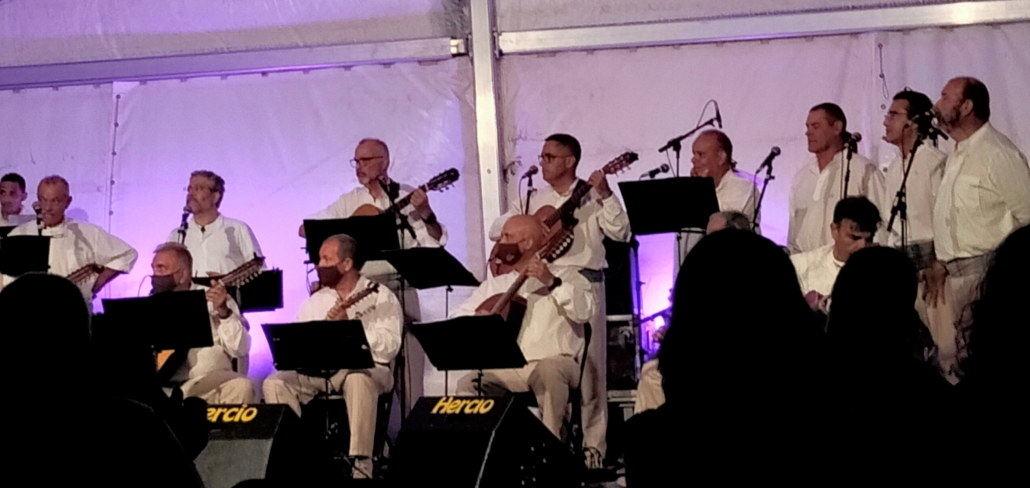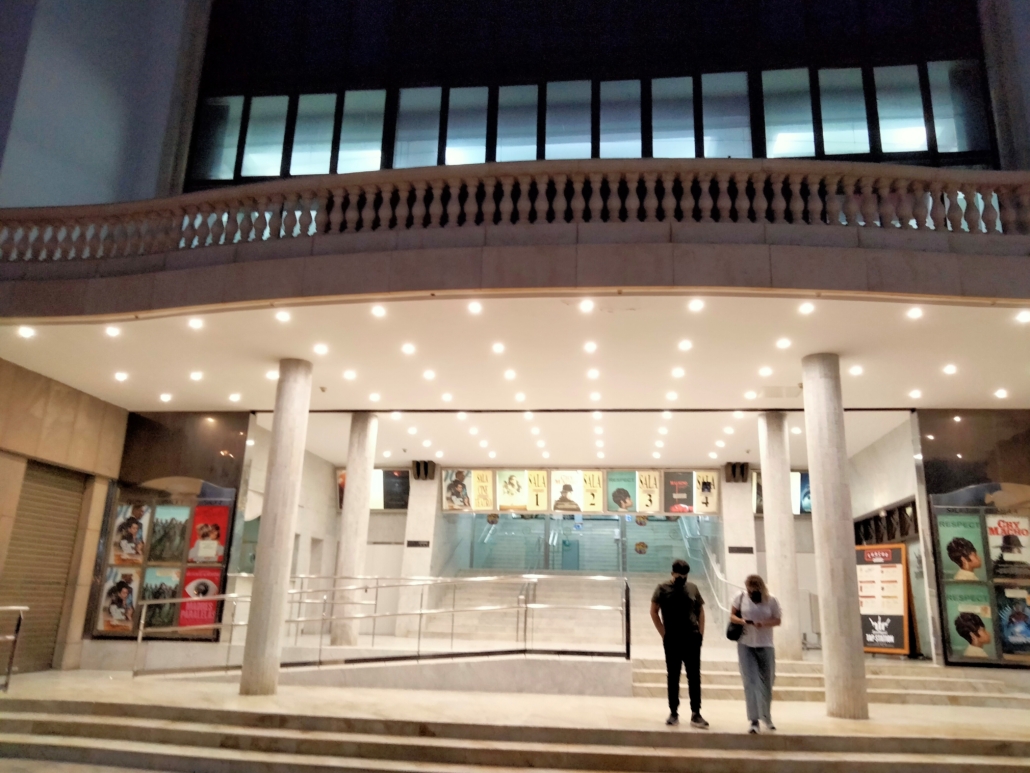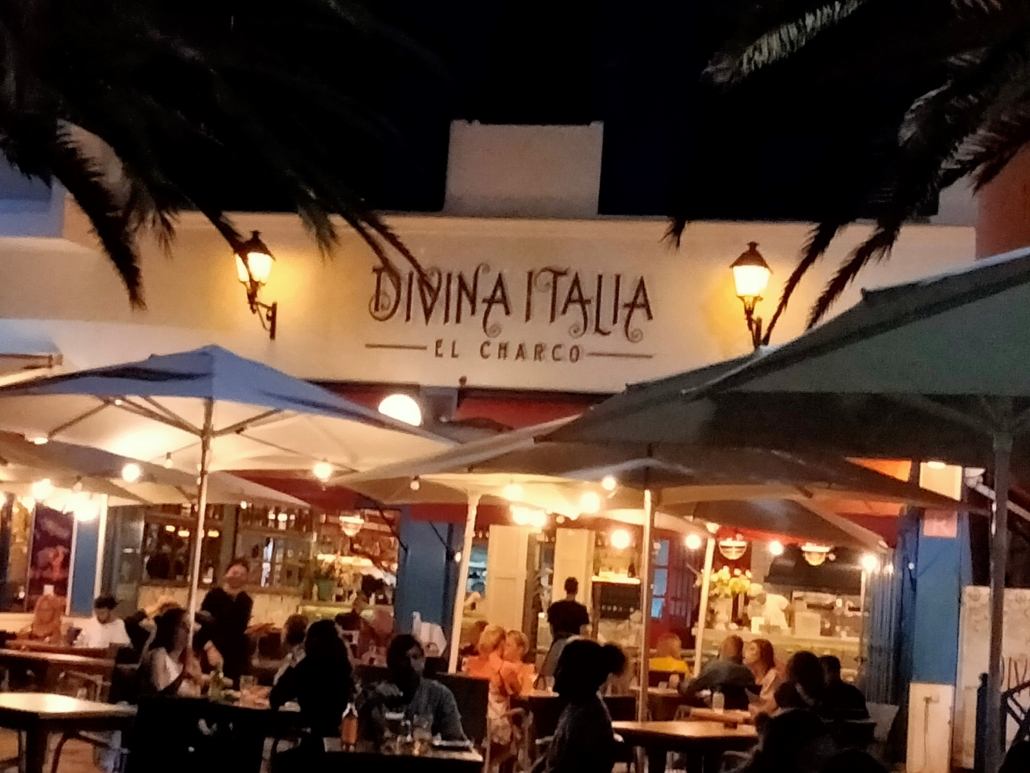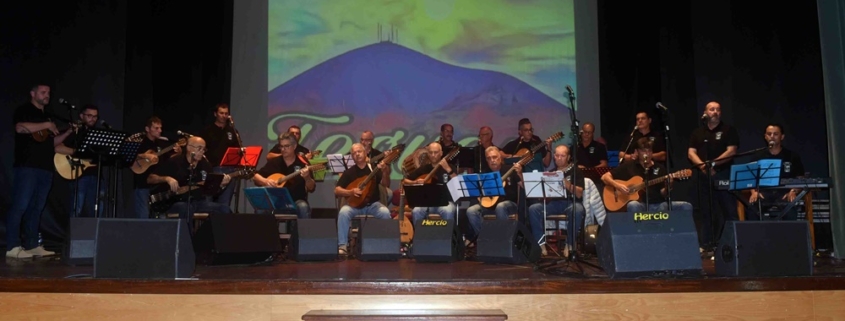IN TIME BETWEEN…..
IN TIME BETWEEN…..
by Norman Warwick
Confident that I had already posted comprehensive geo-specific listings Lanzarote Information and international listings on my own daily blog at Sidetracks And Detours I was confused by the fact that a little flier I had found pinned to somebody´s front door was advertising an event in two days time that I hadn´t been aware of by a folk-lore group I had never even heard of. There was to be a free live concert at 9.00 pm on Sunday evening, in only forty eight hours time. Tickets had to be pre-booked and given that the following would be Saturday, and only a day before the concert, we weren´t hopeful of securing admission. However, our 7.30 am visit to the ecoentradas ticket agency site saw us being given the seat numbers for our free tickets for the concerts and our printed tickets being delivered to us by e mail. Easy Peasy when my wife does it, somehow very complicated whenever I do it. Still, she didn´t mind getting up early seeing as how it was an emergency !
Before settling down to watch the Sunday results show for the first elimination on the current series of Strictly Come Dancing I had looked up on-line information about Grupo Teguey and had learned from good old Lancelot Digital News archives that The Teguey Popular Music Group had been fully introduced to the public at a debut event in a packed Teatro de San Bartolomé a couple of years ago. Teguey had been formed with the aid of the Yaiza Council with the aim of rescuíng´ the traditional and popular Canarian repertoire, and make known the themes of its own production, although in their first concert, South American popular music also had its space. Voices and instruments shook hands at the presentation ceremony to the delight of the attendees.
This important event had apparently taken place Tuesday, April 30 2019.

The idea for the group and its aspirations (left) emerged in a meeting of friends at the end of 2017, in which they decided enthusiastically to get involved in the creation of a Popular Music Group, which they felt their municipality lacked. According to Leo García, director of Teguey, the musical line-up that identifies the group is based on the traditional and popular Canarian repertoire, popular South American and of their own creation, accompanied by timple, contra, guitars, lutes, bandurrias, acoustic bass, percussion and keyboard.
Teguey, in the past couple of years have been consolidated, to their current status of 23 components, under the presidency of Sergio García and direction of Leo García.
Teguey appreciates the great reception that the Group has had and that has seen them become ubiquitous performers on the folk-lore stage at a great diversity of events. For Instance in May, earlier this year, they played at the Agricultural and Artisan Market of San Bartolomé. That gave the opportunity to show their gratitude to the neighbourhood, family and friends present at this great folkloric event. The group told Lancelot Digital news after the event that they ´wish to grow day by day and to be able to give the best of each of its components to enhance the musical values of this land´.
I really hope that the Ayuntamieto (Council) de Yaiza, who are doing great work for the arts whilst at the same time utilising what the arts can do for a community, will take note of the fact that many of us who have settled here permanently from other countries might also have an interest in ´rescuing´ the repertoire Grupo Teguey are seeking to restore and preserve and that perhaps we ´new immigrants´ could be informed of such events where our support might be appreciated. We know we were not the only British present at the gig (now considering ourselves Lanzarotean), as we definitely heard people speaking in our English language. albeit in a different dialect. We also thought we heard German spoken, too.

photo 2 The audience for the Femes concert was seated and expectant as Grupo Teguey (right) , all twenty something of them, strode in single file on to stage, under a starlit sky. The couple of minutes they spent tuning and preparing gave me the chance to identify the instrumental line up, but I´m afraid I can do no better than to say there were lots of stringed instruments including, obviously, the timple, and more surprisingly, the electric guitar. The keyboard player, and the man with a full drum kit, were tucked right into the far back corners at each side of the all-male Grupo Teguey.
If the line up already looked somewhat amazing the very first note of the concert was absolutely startling. Blown on what looked like a conch shell perhaps, it sounded a hunting call or a warning blared out to Robin Hood in Sherwood Forest. This turned out to be the opening note of the group´s signature tune, that they delivered at the opening and the closing of their show. In between they delivered some tunes that it is believed might have originated in the San Bartolome area where many of the performers hail from. We were able to identify some of the titles despite our much less than a poco of Spanish. We had heard Isa Al Campesion before, and remembered its tuneful chorus and we think we may have heard of Waltz Of The Butterflies. Among songs written by members of the Grupo Teguey are Este Es Mi Pueblo, Donde Te Conoci, Teguey and Volcan Sonador, all of which were performed here, and there were interpretations by the excellent guest vocalist. Even in the open air on a windy evening the sound-system behaved itself very well and the songs were carried ón the strength of strings´ as Dylan once wrote. Nevertheless, the songs were underpinned by the flamboyant playing of ´the drums of dawn´ and the music seemed to rill off up into the sky and wheel away some two thousand feet below to the sea.

Every instrumentalist contributed distinctively (even the five masked men (left) playing at the front). Several different members delivered either lead or choral vocals, and created exactly the right sound and atmosphere for this selection of light and lilting material.
When we lived in England, even though we could speak English perfectly well, kind of, we rarely gained added knowledge of the material we heard because some artists, (I think here of Van Morrison, the last time we saw him in concert) communicate not word one of information. Here, where I can´t understand word one of what is being said, the performers invariably deliver encyclopaedic spoken explanations of what the next song is about. And I can understand not word one !
Although I perhaps have some excuse, as I am in my seventieth year, it is quite frightening to confess that all I have picked up in Spanish, since coming to live her six years ago, are two phrases;
No estaba acelerando, la cámara debe estar defectuosa,
and
dos helados, por favor.´
There was no danger, though, of me having to employ that first phrase, given the almost sheer descent, on the hairpin road back down to Playa Blanca. It was a drive through pretty much pitch darkness that my headlights on full beam hardly pierced on six mile stretch of road with no lamp-posts or even cats´eyes.
That, perhaps, was a comment to remind me that this great concert was one about which we had had been in the dark, right up the event itself.
So, it had been a close call but we had at least managed to squeeze Grupo Teguey into our overflowing calendar.

However, the very next day there came an e mail from our friend Larry Yaskiel, honorary editor of the quarterly Lancelot, an encyclopaedic English-language glossy magazine that is a must buy for all tourists over here from the UK. We share a mutual love of music and quite a number of great artists appear in the shaded area of the Venn diagram of music that matters to Larry and Norm, (shown left as Larry signs one of his books for Norm)- Before coming here to Lanzarote, Larry was a mover and shaker on the msuci scene, first in Germany and later in Europe. He was a close working colleague of Herb Alpert at A & M records, which I only mention as a lead in to saying that Herb´s latest album, Zoo Time, released recently is currently enjoying some critical acclaim and commercial success.

Larry was informing me that the main cinema next to the protected inland harbour of San Gines in Arrecife was this week showing Respect: The Biography Of Aretha Franklin, that is still a relatively new release, having only been distributed on 10th September 2021. It stars Jennifer Hudson and Forest Whittaker (right) who was so brilliant as Idi Amin in The Last King Of Scotland.
In truth, Dee and I have never really been big cinema-goers as you might guess by the fact that Grease was the last film we saw. We are of a generation who are quite comfy sitting at home in front of the movie channels and pretty much accepting whatever they might be showing. Larry´s advice, however, was perfectly timed because not only would it send us our first Lanzarote cinema experience, but would also give us a sighting of a film I had become interested in since reading a review in The Guardain a few weeks earlier. I was already quite excited, and turned back to an on-line posting of that review I had read a few weeks ago by Peter Bradshaw. I had nodded sagely to all the points Mr. Bradshaw had made in a slightly less than stellar report but I was now seeking to look put his views to closer examination, when seeing the film for myself.
He notes that ´at one moment in this very respectful film, a worried supporting character says: “I can’t do this any more.”
´Maybe none of us can, wrote Mr. Bradshaw. The spoofability of music biopics has been a known quantity for so long that perhaps, through some quirk of the collective creative unconscious, they have just re-absorbed the cliches, reinforced and clarified them as a proven formula for success. But what if the troubled lives of pop icons aren’t like this? What if they can’t be reduced to flashback abuse vignettes, recording studio rows, early-success montages of album and magazine covers, marital breakdown crises, booze nightmares and final redemption scenes before the final credits over which, in time-honoured biopic style, we see footage of the less conventionally attractive real person?
I was soon nodding sagely again. Certainly when recalling Bessie Smith or in search of Ella Fitzgerald those precise formats seem to have been followed. So have investigations by other media into the life and career of Billie Holiday.
However, The Guardian´s reviewer acknowledged that ´Jennifer Hudson tries her hardest with the role of soul legend Aretha Franklin, but there is quite frankly a lot of hammy and inert acting going on here. Scene follows scene and facial expression follows facial expression with a bass-drum clunk, transitions which might work better on Broadway. Having said this, Hudson is not supported by a script that skates over the difficult stuff and acknowledges the unhappiness and pain in her life in only the most generalised and evasive way. We see Aretha as a little girl, sleeping happily in her bedroom in the family home in Detroit, Michigan in the 1950s. Her dad, the renowned minister CL Franklin – a role to which Forest Whitaker lends his formidable presence – is in the habit of actually waking her up, and making her come out to the living room in her nightgown and sing rather adult songs for his somewhat louche party guests: Ella Fitzgerald’s My Baby Likes to Bebop. The movie suggests that one of these guests almost certainly abused the young Aretha´.
Having now seen the film I have to agree with Mr. Bradshaw´s description of the acting, before providing himself with the get out clause that the leading lady and the cast had perhaps been failed by the script. However, for some of those prolonged pauses and over-held moments of drama, as if awaiting the Eastenders´ style dum dum dum ending, surely the director must be in the frame, as it were.
´Later, Aretha marries the highly unsuitable and violent Ted White (Marlon Wayans) and gets a recording contract with Atlantic Records’ Jerry Wexler (Marc Maron). She struggles to find a sound – but eventually, through the passion and trials of her personal life reinvents the Otis Redding song Respect as her personal anthem and musical manifesto of liberation, an inspired pop-cultural declaration of war against racism and sexism.
Abuse, misogyny and exploitation (the staple diet of jazz and blues biofilms)were certainly facts of life that Franklin would have had to transcend. But the film mentions almost in passing her two children from an early relationship and having hinted at the almost tragic, enigmatic relationship with her father, it can’t find a way of fitting that complexity into the biopic template. A more ambitious film would have tried to get to grips with this centrally important relationship, and made it the whole point of the drama. Fans of the recently rediscovered documentary filmed record of her live soul album, Amazing Grace know that the Mr Franklin Senior had a habit of bustling forward and mopping Aretha’s brow while she was actually singing – an endearing, unnerving habit that is actually shown here. They were very close. But this film is always straining to typecast Aretha’s father as the stern preacher-man and paterfamilias from whom Aretha had to break free. But it wasn’t as simple as that; the tender, shrewd, music-savvy Mr Franklin who pushed Aretha’s career and had a lively, cosmopolitan mix of friends can’t be fitted into that stereotype´.
I would agree that some of the major characters seem stereotyped and one-dimensional and if screenwriters lock in their characters as one-dimensional stereotypes then there is no character left in their film with a story to tell. Too often we forget, that the characters of a story (whether it be factual, fictional or factive) who develop the plot.
¨This is a long, laborious movie.´ Mr. Bradshaw added, ´whose every scene feels hackneyed at some level and which is always drifting towards its own misjudged secular gospel of simplistic salvation and life lessons learned. But an artist’s life is more complicated than that´.
The redemption such films always seem to feel compelled to include was perhaps not apparent at the time it happened in real life, if indeed it ever happened in real life. We need to remember, too, that not every sin is cardinal. Those who write, who sing, who play, who promote or who merely serve the drinks are all human and surely all of them in some way deserve some credit, however small it may be, to the wonderful origins traditions and fusions of jazz and blues and soul.
Although I never met or interviewed Aretha Franklin the performance by Jennifer Hudson seemed to me to capture the Aretha I remember from tv performances, who always seemed to me be in a place of ecstacy when she sang but far less than comfortable in conversation and social circles, and Forest Whittaker´s performance is quite astonishing as he perfectly underplays a flawed man capable of genuine love and affection.
The film hints at, rather shows us directly, the depravity that surrounded Aretha with perhaps only Jerry Wexler at Stax records and the musicians at the Muscle Shoals recording studios showing her the respect her singing and playing deserved.
Like most music biopics the film show everyone wanting a piece of the star and although I couldn´t follow the Spanish dubbed dialogue (and if there is an Oscar for best foreign language dubbing, this film should get it) the narrative seemed to me to address the age-old bug bear of classification. Aretha had a real ability to cross-over, but those in the soul camp didn´t approve of her recording ´disco´, blues fans didn´t like her recording jazz and those from the gospel choirs from which she merged didn´t approve of any of it. That the singer seemed to in her late career return to that fold seems to be celebrated by the film as a redemption, and that whole scenario will now send me to read up on Aretha Franklin and try to form a clearer picture of her.
photo cinema Overall, I think the film and its cast deserve our r-e-s-p-e-c-t.

As for the cinema experience itself, the pre-booking was easy enough and the cinema (left) sits on the waterfront and at night offers a beautifully lit back drop to the hundred and more boats moored on the water. Inside, this was for me very much a twenty first century experience and was a million miles and years away from the back row of The Mayfair in Whitefield. The seating was spacious and comfortable, the screen was hugw and the surround sound was incredible. The flicks have come a long way.

The free car-parking, to which we finally returned after a wonderful meal at the nearby Davinia Restaurant was well worth the euro the volunteers asking for to ´look after the car.
So, it was only the first Thursday evening of the month and we had already ticked one event off our calendar as ´seen´ and added two new event to our calendar which we had now also ticked as ´seen´.
We actually arrived home from the cinema ro even more news on our e mail that although not specifically about the arts was yet more positive news of developments on Lanzarote. Earlier this year we reported the dueen appearance of massive sionk hole appearing on the coat road in the South of the island. It was a result of the sea eroding rocks three hundred feet below the road surface, and everything above them subsiding. Fortunately nobody was hurt but the road has been closed now for six months, causing huge loss of income to the salt pans of Salinas de Janubia (below) and the restaurants of El Golfo further down the road.

The good news is that The Ministry of Agriculture, Livestock and Fisheries of the Government of the Canary Islands has awarded a grant valued at 103,000 euros for the project given the snappy little title of ‘Revaluation of the Salinas de Janubio, diversification towards ecotourism and the blue economy’. The objective is the recovery of architectural heritage and salinero (salt) culture with the rehabilitation of the mills; drafting of the environmental document for the permit application; redesign of the interpretive route; and tour operator audits. In addition, this initiative contemplates the promotion through the preparation of brochures and advertising of the tourist product.
With this help, from the FEMP, the government also contributes to the maintenance of an ancestral activity, in addition to preserving our landscapes and promoting a tradition so deeply rooted in the Archipelago.
It should be remembered that the regional department convened at the beginning of this week a new edition of the Official Agrocanarias 2021 Marine Salt Contest, which will be held in Gran Canaria on November 16 and 17 in its preliminary and final phases, respectively.
There is no specific mention there of repairing the sink hole, but I guess that is a given, and all this will certainly help achieve the aspirations we learned about from our friend we dubbed Sara Del Salinas and published in an interview with her prior to the arrival of the sink hole. The article was entitled Sara De Salineras Speaks Of Salt And Sees Its Future, published on 19th November 2019 and still available in our archives.
So by now, Friday morning 8th October, I feel I have been in a whirlwind ever since I had been able to see that concert on the first Sunday of the month less that a week ago.
Nevertheless when I was living in England that first Sunday of every month in my calendar was always the bearer of the words ´Baum; Do not miss !
That was because I used to co-host the monthly poetry reading sessions at The Baum on Toad Lane, with Robin Parker, the founder and protector of the event and its contributors who we fondly labelled as The Bard From The Baum. Robin and I ran the nights together until I retired to come and live here on Lanzarote, and Robin is still running an event that often features more than twenty readers. I am probably the least tech-savvy of any of those involved but nevertheless it is to be applauded that Those Bard From The Baum ensured the event survived the covid attacks by adapting to zoom sessions, and only this month they have returned to ´live´ performances.
Robin wrote in the all across the page of The Rochdale Observer, to which he is a frequent contributor, about how pleased he and his colleagues are about stepping out of doors again, and also explained why the group has taken the opportunity to re-locate to a different venue, in a change that has seen the group adopt a new name.
Under a headline of
BARD FROM THE BAUM REGENERATE AS PEGASUS
Robin Parker wrote that ´This pandemic has been strange time for creative writing and performance groups.
Our particular group, with the name Those Bard From The Baum, had to abandon opur monthly meetsings in the upstairs room of said tavern and instead had to discover the on-line phenomenon known as Zoom.
For performance poetry and prose Zoom became a lifeline, though not everybody´s taste and Those Bard From The Baum lost some of their regular performers. it remained co-hosted, on zoom as it had been on the real world, by myself and Eileen Earnshaw and there was initially such enthusiasm from those remaining that we moved from monthly meetings to fortnightly.
However, as moths progressed people began tyo feel ´zoomed out´ and as vaccinations gave greater freedom to the wider community we decided to look at meeting fdace to face again.
But, Houston, we had a problem.
During lockdown The Baum had been refurbished and the upstairs room had b een turned into a specialist private dining area of limited capacity and we had to search for a new venue.
Fortunately The Flying Horse came up trumps !
We were originally going to meet downstairs in our new venue, but some mebers felt it would ber too cramped and so we went to upstairs function roolm, couretesy of the landlord, Ben Boothman.
It couldn´t have been better. The tables were large which enabled space between performers. On our first night, there 26 of, most of who participated in one way or another and we welcomed back people who had not chosen Zoom. The other great benefit of a live venue was that it enabled people to play and sing in harmony.
In particular we had one group of Ukelele players, The Uketeers, who had been unable to perform opn Zoom because they had all lived at different residences. They have now regenerated themselves as The Ukerocks !
The collective company of Those Bard From The Baum have nowalso been regenerated as Pegasus, a name approved by Michael Higgins (the arts and culture correspondent for these pages at Sidetracks And Detours)
As with previous live meetings at The Baum the great pleasure of the collective is the quatity and quality and dioversity of the poetry on offer. Some could almost bring tears to the eyes and others would have you in fits of laughter.
it is important to point out though we are not any kind of closed clique, In fact, we welcome all, participants and audience alike.
We meet on the first Sunday of every month in the upstairs room at 7.30 pm in The Flying Horse, near Rochdale Town Hall´.
Rochdale has so many excellent writers, and excellent facilitators like Robin, Eileen and Seamus Kelly and I am sure they will all be very busy yesterday over there in the UK, as the first Thursday of October is always the date set aside for the country´s annual National Poetry Day.

Pegasus readers and no doubt members of Langley Writers (logo show right) and Touchstones Creative Writing Group, too, will have selected poetry and taken it into local schools and given readings reading, facilitated writing, choreographed performance, – and will probably have made use of the wide range of resources available from the National Poetry Day and National Poetry Society programmes. This year, as every year, there is a schools-focused challenge, #MyNPDPoem with inspiring videos and prompts and resources to help writers and children to work together.
Many of the poets and writers and performers will have employed The National Poetry Day tool-kit for schools to inspire students
With support from people such as those who attended the Pegasus Poetry evening at The Flying Horse, the National Poetry Society create new resources for young people and support young poets.
The theme that visiting poets, teachers and pupils will be addressed this year was Choice, and there has been a concerted theme each year since the inaugural National Poetry Day in 1994, by the charity Forward Arts Foundation. The Foundation aims to celebrate excellence in poetry and to increase its audience. For assistance in doing so they have always enjoyed the support of the BBC as well as of Arts Council England, cultural organisations and leading literary and cultural organisations, alongside booksellers, publishers, libraries and schools.
The prime source for this article included a cinema review by Peter Bradshaw published in The Guardian, a news item published by Lancelote Digital news and a piece by Robin Parker on the all across the arts page, edited by Steve Cooke in The Rochdale observer, and on line sites referring to national Poetry Day UK.
In our occasional re-postings Sidetracks And Detours are confident that we are not only sharing with our readers excellent articles written by experts but are also pointing to informed and informative sites readers will re-visit time and again. Of course, we feel sure our readers will also return to our daily not-for-profit blog knowing that we seek to provide core original material whilst sometimes spotlighting the best pieces from elsewhere, as we engage with genres and practitioners along all the sidetracks & detours we take.




Leave a Reply
Want to join the discussion?Feel free to contribute!